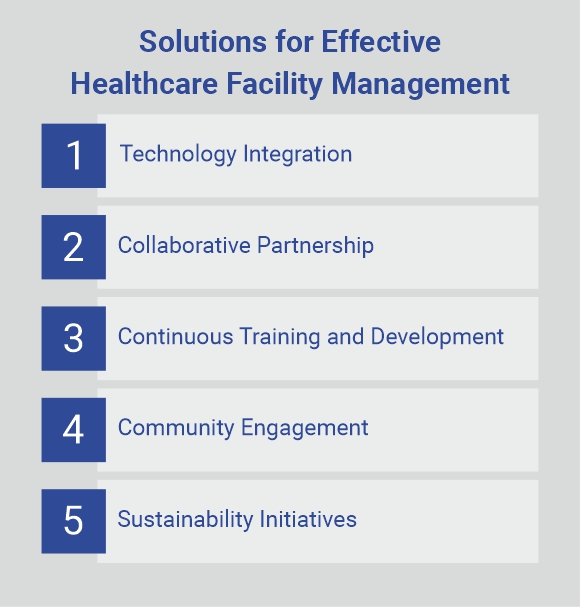Introduction :
Facility management plays a crucial role in ensuring the smooth operation of healthcare facilities. In the dynamic landscape of healthcare in India, the importance of facility management cannot be overstated. Healthcare Facility Management in India encompasses a wide array of tasks, from ensuring the seamless operation of medical equipment to maintaining cleanliness and safety standards. In a country with a diverse population and varying healthcare infrastructure, effective facility management is essential for delivering quality care and optimizing resource utilization. This blog delves into the significance of facility management for healthcare facilities in India and highlights its role in enhancing patient outcomes and operational efficiency.
Improving Patient Care:
At the heart of healthcare facility management lies the goal of improving patient care. Well-maintained facilities contribute to a conducive environment for healing and recovery. From clean and sanitized spaces to efficient equipment maintenance, every aspect of facility management directly impacts the patient experience. Timely response to maintenance issues, effective management of resources, and adherence to safety protocols all play a crucial role in ensuring that patients receive the highest standard of care.
Enhancing Operational Efficiency:
Efficient facility management practices are essential for the smooth operation of healthcare facilities. From facility maintenance to asset management and space utilization, every aspect of operations falls under the purview of facility management. By implementing preventive maintenance schedules, optimizing workflow processes, and leveraging technology for data-driven decision-making, facility managers can enhance operational efficiency and mitigate potential disruptions. This, in turn, translates to improved productivity, reduced downtime, and better overall performance of healthcare facilities.
Challenges Faced by Healthcare Facility Managers in India:
1. Infrastructure Constraints:
India's healthcare infrastructure varies significantly across regions. While urban areas might boast modern facilities, rural regions often lack basic infrastructure. Facility managers must navigate this dichotomy, ensuring that resources are allocated efficiently to meet the diverse needs of the population.
2. Regulatory Compliance:
Healthcare regulations in India are stringent and subject to frequent updates. Facility managers must stay abreast of changing regulations to ensure compliance and avoid penalties. This includes adhering to licensing requirements, sanitation standards, and fire safety protocols.
3. Cost Management:
Cost management is a perpetual challenge for healthcare facilities in India. Balancing the need for quality care with financial sustainability requires strategic planning and resource optimization. Facility managers must find innovative ways to reduce operational costs without compromising patient care.
4. Staffing and Training:
Recruiting and retaining skilled healthcare professionals is a persistent challenge. High attrition rates, especially in rural areas, exacerbate staffing shortages. Facility managers must invest in training programs and incentives to attract and retain qualified staff members.
5. Patient Expectations:
Patients in India have diverse cultural and socioeconomic backgrounds, leading to varied expectations regarding healthcare services. Facility managers must tailor their services to meet the unique needs and preferences of their patient demographic, which often requires cultural sensitivity and communication skills.
Solutions for Effective Healthcare Facility Management:

1. Technology Integration
Embracing technology can streamline various facility management processes, from inventory management to patient scheduling. Implementing electronic health records (EHR) systems and telemedicine platforms can enhance operational efficiency and improve patient outcomes.
2. Collaborative Partnerships:
Collaborating with government agencies, NGOs, and private sector stakeholders can help healthcare facilities access additional resources and expertise. Public-private partnerships (PPPs) can facilitate infrastructure development and service delivery in underserved areas.
3. Continuous Training and Development:
Investing in ongoing training and development programs for staff members can enhance their skills and job satisfaction. This includes technical training on medical equipment, as well as soft skills training in communication and patient care.
4. Community Engagement:
Engaging with local communities can foster trust and cooperation, improving the overall healthcare experience. Facility managers can organize health camps, awareness campaigns, and outreach programs to educate the community and address their healthcare needs proactively.
5. Sustainability Initiatives:
Implementing sustainable practices not only reduces operating costs but also minimizes environmental impact. Facility managers can explore renewable energy sources, waste management solutions, and water conservation measures to promote sustainability.
Conclusion:
Healthcare Facility Management in India presents a myriad of challenges, ranging from infrastructure limitations to regulatory compliance and cultural diversity. However, by adopting innovative solutions and embracing collaborative approaches, facility management service providers can overcome these challenges and ensure the delivery of quality healthcare services to all segments of the population. By prioritizing technology integration, staff training, community engagement, and sustainability initiatives, healthcare facilities can navigate the complexities of the Indian healthcare landscape and emerge as beacons of excellence in patient care. As India continues to advance its healthcare infrastructure and expand access to quality care, effective facility management services will remain indispensable in driving positive outcomes and improving the health and well-being of its population.
Partnering with FFServices for facility management requirements offers healthcare facilities a strategic advantage in navigating the complexities of the healthcare landscape. With a proven track record of excellence, FFServices brings expertise, innovation, and a commitment to quality that aligns seamlessly with the unique needs of healthcare environments. By entrusting their facility management to FFServices, healthcare facilities can focus on their core mission of delivering exceptional patient care while ensuring operational efficiency, regulatory compliance, and a superior patient experience.
Contact us today to have your healthcare facilities confidently embark on a journey towards enhanced performance, sustainability, and success.
Industries we serve:
Automobile | Ancillary | Manufacturing | Pharmaceutical | Healthcare | Oil and Gas | FMCG | Education | Real Estate | Commercial
Also read: The Vital Role of Emergency Preparedness in Facility Management

